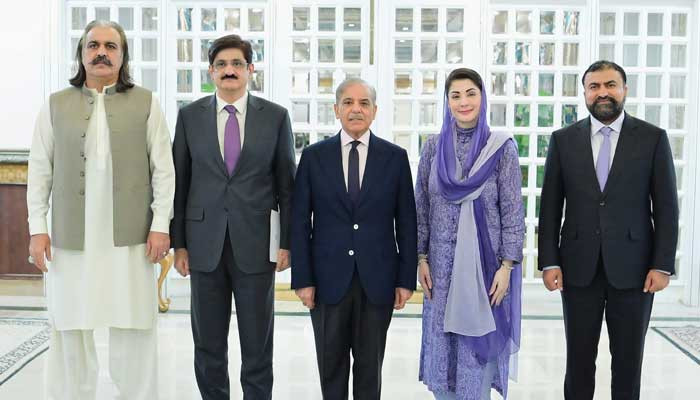CCI Rejects Federal Plan for New Canals
ISLAMABAD: The Council of Common Interests (CCI) has dismissed the federal government’s proposition to construct new canals, thereby reversing the decision made by the Executive Committee of the National Economic Council (ECNEC) on February 7.
A statement released by the Prime Minister’s Office following the CCI meeting conveyed, “No additional canals will be built absent of mutual understanding and agreement among all provinces… The central government will not proceed with any strategies until a comprehensive consensus is achieved between the provinces.”
Prime Minister Shehbaz Sharif presided over the session, which was originally planned for May 2 but was advanced at the behest of the Sindh government to address the disputed canals initiative that ignited widespread controversy in Sindh.
The eight-member council is comprised of the chief ministers from all four provinces. Deputy Prime Minister and Foreign Minister Ishaq Dar, Defence Minister Khawaja Asif, and federal minister Ameer Muqam also hold positions within the council.
Twenty-five individuals were present at the CCI assembly through special invitation. The assembly was convened to address a six-point agenda.
The CCI evaluated the Sindh government’s agenda pertaining to the proposal for fresh canal ventures.
According to the statement, the federal government is working collaboratively with all provincial governments to foster a lasting accord on agricultural policy and water management infrastructure throughout Pakistan.
“The policy underscores that the water entitlements of all provinces are safeguarded by the Water Apportionment Accord of 1991 and the National Water Policy of 2018, ensuring complete consensus among stakeholders,” it stated.
To allay the apprehensions of every province and assure the nation’s food and ecological stability, a committee will be formed, encompassing representatives from both the federal government and each provincial administration.
This body is tasked with proposing resolutions that are in accordance with the two consensus documents, with the aim of fulfilling Pakistan’s long-term agricultural requirements and water utilization demands, the statement clarified.
The declaration further emphasized that water, being a crucial national resource, must be handled according to the values of mutual comprehension and teamwork, as anticipated by the creators of the Constitution.
“The government is dedicated to settling all water-related conflicts amicably, guaranteeing that the worries of any province are taken care of through appropriate diligence,” it declared.
Considering these dialogues, the CCI has also resolved to reverse the provisional ECNEC endorsement issued on February 7, 2024, for the building of new canals, along with the IRSA water availability certificate given on January 17, 2024.
The Planning Division and IRSA have been instructed to have additional conversations with all parties to ensure national solidarity and settle any outstanding anxieties until mutual agreement is attained.
Speaking to reporters after the assembly, Khyber Pakhtunkhwa Chief Minister Ali Amin Gandapur stated that a renewed promise was made to secure fair water rights for each province.
During the session, he affirmed that the judgment to erect new canals from the Indus River had been revoked. “It has been agreed upon to resolve matters through mutual understanding,” he supplemented.
Gandapur noted that three demands from Khyber Pakhtunkhwa were sanctioned to be added to the schedule for the upcoming CCI assembly. He mentioned that an assessment of the National Finance Commission (NFC) Award will also be integrated into the subsequent session’s plan.
The chief minister additionally reported that the proposal to recognize tobacco as a formal crop will be presented in the next session as well. He depicted the inclusion of these demands as a significant triumph for the people of KP.
Defence Minister Khawaja Asif said that the CCI has decided that the canal issue would be taken up at a later date with the consensus of all the provinces.
He noted that any fresh initiative concerning canals would be initiated after evaluating the water situation in rivers “with complete agreement from the provinces”.
The Cholistan Canals subject has surfaced as a critical source of disagreement between the Pakistan Peoples Party (PPP) led Sindh government and the PM Shehbaz Sharif-led government.
The federal government intends to establish six canals on the Indus River for the purpose of irrigating the Cholistan desert — an initiative that was opposed by its primary ally PPP, along with various Sindh nationalist factions.
According to governmental sources, the projected expenditure for the Cholistan canal and system amounts to Rs211.4 billion. Through this endeavor, a substantial expanse of infertile terrain could be repurposed for agricultural activities, potentially bringing 400,000 acres of land under cultivation.
Almost all political and religious organizations, nationalist blocs, and civil society groups, together with legal professionals, are currently organizing widespread demonstrations and sit-ins all over Sindh in protest against the contentious strategy.
Despite the premier’s reassurance, the sit-in at Khairpur Baberlo bypass in objection to the disputed canal project has persisted for eleven days, resulting in the disruption of traffic between Sindh and Punjab — while the demonstration at Mangrio Pump near Daharki on the National Highway has persisted into its ninth consecutive day.
The current impediment has gravely affected the transportation of vital commodities, notably petroleum and food supplies, as trucks and trailers stay immobilized. This predicament has also heightened hardships for commuters and transporters.
Drivers of heavy containers grounded due to the demonstration have reported that the tires of their vehicles are falling apart due to extended idleness.



Comments (0)
No comments yet. Be the first to comment!
Leave a Comment